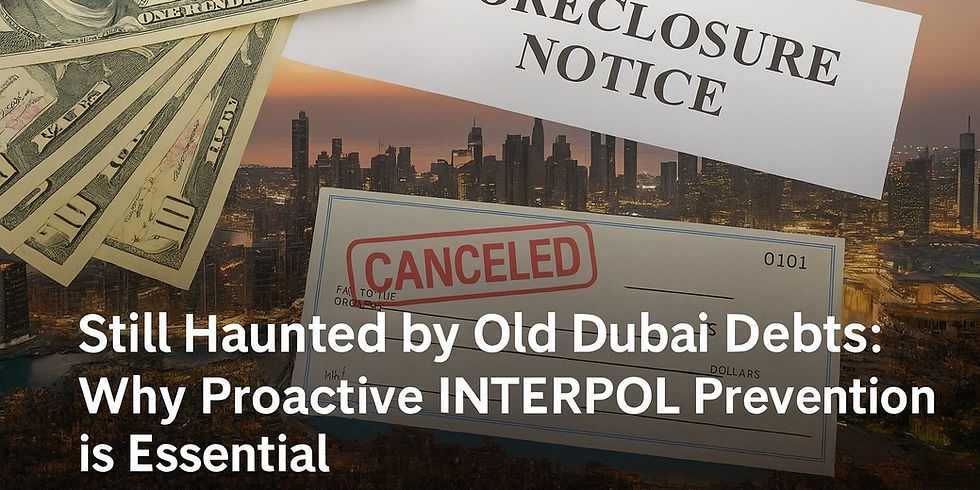“Bahrain seeks to punish Hakeem through extradition process and show strength to gulf allies”
- Detained in Dubai
- Oct 2, 2019
- 4 min read
We’ve made it quick and convenient for you to manage your blog from anywhere. In this blog post we’ll share the ways you can post to your Wix Blog.

The disturbing news has broken that Bahrain intends to continue with the extradition request of Australian resident, Bahraini refugee and pro footballer Mr Hakeem Alaraibi. Bahrain has not responded to the international campaign and media pressure to withdraw their application, and Thailand has seemingly not sought a diplomatic resolution with Bahrain, a solution that is still available to Thai authorities. The unfair detention of Mr Alaraibi is placing intense strain on Australia’s long term relationship with Thailand, as many high profile individuals, groups and key politicians seek his immediate return to Australia. Australian national Radha Stirling, founder of Detained in Dubai and expert witness in extradition and Interpol cases who is supporting the campaign to #SaveHakeem, said “While Thailand continues to allow the judicial procedure to unfold, the country risks its own reputation and its tourism industry being dragged down by a gulf nation notorious for human rights abuses, torture and unfair detentions.”
Had Bahrain made the decision to withdraw its request at the early stages of arrest, Hakeem would have been free to return to Australia and the consequences for Bahrain would have been minimal; Instead, Bahrain has made the deliberate decision to push for extradition, even against its own interests with Western allies. Stirling said “Middle Eastern countries notoriously push for full extradition trials, even where they are fully aware that they will lose such a request. They do this as a means to punish individuals like Hakeem, to set an example to other would-be activists, or to show their power to gulf allies. In some instances, they simply do not wish to admit that the request was wrong or that they have flaws in their own judicial process, or admit they engaged in Interpol abuse. Middle Eastern countries often vacillate between allying themselves with Western interests or rallying the support of gulf neighbours. Bahrain does not wish to lose face amongst their Arab friends”.
Although it has already been determined that the Interpol notice was in violation of Interpol’s own rules, its withdrawal and cancelation does not mean the extradition request will be withdrawn. Extradition requests can be made directly to another country in the absence of a Red Notice. Ms Stirling commented “As it was the Red Notice that caused his arrest, Interpol’s lack of a formal process to prevent such a notice being listed renders them open to precedent-setting legal action and when Hakeem is finally free, I would encourage him to take such action to force accountability on Interpol for their negligence”.
In most Western countries, in a situation such as Hakeem’s, bail would be granted to the individual facing extradition. This is largely due to the fact that Western nations have become aware of Middle Eastern nations misuse of Interpol & Extradition proceedings as a means to harass or intimidate victims, and because these same countries are aware that an extradition is unlikely given the expectation of unfair trials, human rights violations and torture. Radha Stirling has appeared for the defence in a number of extradition requests from Middle Eastern countries. Stirling says “In almost all cases, bail was granted throughout proceedings and there is no cause to hold Hakeem in custody; He is not a flight risk, nor a violent offender. He has passed Australia’s most stringent process and successfully sought asylum. It is bad enough that he must face this grave legal abuse, but to not be granted bail in the interim is absurd”.
In the event that Thailand does not diplomatically resolve Hakeem’s freedom, the Thai courts may choose at the preliminary hearings to deny Bahrain the option to proceed to a full trial and he may be released once this decision has been made. In the event that Thai courts allow a full trial, Hakeem will be detained in Thailand pending a full hearing, potentially without bail. The question here is whether Thai courts will foresee the extradition request’s failure on the basis of Hakeem’s refugee status and on human rights considerations, thus ruling in his favour at the first hearings; Or whether they will allow that decision to be made after hearing full submissions which may take months or years. Stirling said “I of course, call on Thai judicial authorities to follow accepted standards and to fulfil their obligations under the conventions they have signed respecting human rights and torture and see that in fact, Hakeem’s unfair detention is indeed already a violation of his human rights, and another form of torture he has had to endure. Hakeem, like many others, is facing a cruel, lengthy and unnecessary process that highlights serious flaws in international extradition standards, in that, there are none. Western governments need to assess the extradition standards of their friends and allies, in order to ensure citizens are not at risk of being extradited to countries where they may face human rights abuses, torture or extrajudicial executions. Australia needs to issue urgent travel warnings to citizens and residents to avoid countries like Thailand, who appear to be cooperating with authoritarian Middle Eastern regimes”.
Radha Stirling has called on Australia-Thailand Chamber of Commerce business leaders to support Hakeem’s release, FIFA’s support, as well as urgent Interpol reforms, worldwide extradition standards and Williams Formula 1 fans to avoid the Bahrain hosted race in March.




Comments